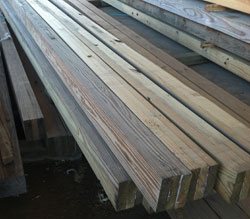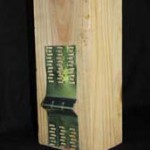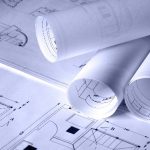Let’s Not Uplift
I learn new things every single day, much in part to loyal readers, the Hansen Pole Buildings’ Building Designers and our clients. Column uplift seems to be a repeating point of contention for me, as it is (in my humble opinion) poorly addressed, if not totally ignored. Reader Dan has some uplift concerns as well:
DEAR POLE BARN GURU: First I want to thank you for writing this thing, I can’t stop reading it, and constantly am learning new things.
I am planning a medium building in the back yard, 21 x 30 x 9.5 high – being that its purpose has evolved over the years it’s been planned, it grew from very small simple to the size it is now. It also is being made with recycled/collected materials. So it’s a hybrid design, posts 6 ft on center with a beam and 5/12 trusses on 24″ center.
 But I’m trying to decide how to deal with the uplift load. I really like those new vee’ed plate you mentioned, and even got a few samples to try installing. BUT I’ve never had good luck installing that type of connector. (with a hammer) Which leaves a couple options –
But I’m trying to decide how to deal with the uplift load. I really like those new vee’ed plate you mentioned, and even got a few samples to try installing. BUT I’ve never had good luck installing that type of connector. (with a hammer) Which leaves a couple options –
1) make my own using nail on mending plates – these are limited to something in the 3-4000 lb shear due to the nails (assume 10 each). But they would be easy to install, and I’d use 4 per pole.
2) But then I wondered, what if a guy modified the pole to get better adhesion and maybe some shear in the joint? I’m thinking several shallow vee cuts in the post. Got to think about this a bit more but.
Your thoughts? DAN in MOUNDS VIEW
DEAR DAN: Thank you very much for enjoying my musings. I am going to make a few recommendations, and then get on to your question.
Building size, no matter what size you construct, it will not be big enough. Just trust me on this one, after nearly 20,000 buildings I am still waiting for a client to call and tell me their building is just too big. Been there myself more than once. Construct the largest building which will fit on your property (within Planning Department restrictions) and be within your budget (which might include having a monthly payment due to financing).
Used materials are problematic – especially if the trusses have been previously used. The Building Codes change every three years and much of the more recent changes have involved snow and wind loads as they apply to trusses. The latest advances and technology are those which you want to be going with.
Columns at six foot on center could pose some challenges later on – most often it is with doors wanting to be added at a later date and having to deal with a column or columns which are in the way. Every six feet also means a bunch of holes are going to have to be dug.
 My perpetual recommendation is going to include investing in engineered plans for your new post frame building. The last thing you want to have happen is a failure of your new dream building after all of your years of planning and efforts.
My perpetual recommendation is going to include investing in engineered plans for your new post frame building. The last thing you want to have happen is a failure of your new dream building after all of your years of planning and efforts.
Now your question.
For those who are unfamiliar, the nail on plates you mention are covered in depth here: https://www.hansenpolebuildings.com/2013/04/truss-plates-for-column-uplift/.
There actually is a very simple uplift solution, which will be more than satisfactory in most instances: https://www.hansenpolebuildings.com/2017/03/fall-go-boom/.
Keep on reading Dan, it is appreciated!








